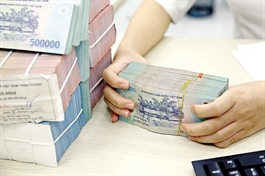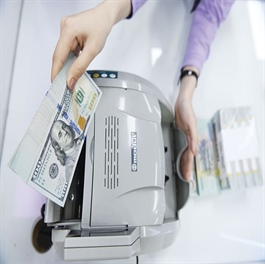Preparing to make most of a billion-dollar market in 2026
Preparing to make most of a billion-dollar market in 2026
Starting in 2026, a new legal framework will pave the way for local enterprises to join the billion-dollar cryptoasset market. Bach Nghiem, co-founder of Vietnamese-developed ATX, talked to VIR’s Hoang Oanh about strategies for domestic exchanges to break through and compete equally with international counterparts.
How does ATX assess the potential of the cryptoasset market in Vietnam, especially when Vietnam is moving towards recognising and putting into trial operation the first crypto exchange this year?

Bach Nghiem, co-founder of Vietnamese-developed ATX |
From the very beginning, many advised us to target the international market because developing technology abroad is often easier, as proven by Vietnamese names like Kyber and Sky Mavis, who have succeeded globally. However, we remain steadfast in Vietnamese market first, as the growth potential here is immense.
Vietnam may have disadvantages in many traditional industries, but with blockchain, a new and attractive field, we are almost on par with the world in terms of timing of access.
In mid-July, the US House of Representatives passed a bill to regulate US dollar-pegged stablecoins. In April, the European Parliament and the EU Council passed the first Markets in Crypto-Assets Regulation, considered the most comprehensive legal framework for digital assets to date.
Vietnam is also developing laws related to digital technology and digital assets. The Digital Technology Industry Law, passed in June and effective from 2026, recognises digital assets and cryptocurrencies as legitimate assets under the Civil Code, while providing a regulatory framework to protect and encourage technological innovation.
At ATX, we have experienced a growth of 7-8 times since September 2024. I believe that starting from 2026, when digital assets are officially recognised and licensed for trading, investors will feel more secure and the capital inflow into the market will surge significantly.
What are the differences in behaviour and investment trends of crypto-asset investors in the Vietnamese market compared to countries in the region?
The scale and purchasing power of the Vietnamese market are not inferior to any country in the region. Many businesses choose to register in other countries because the legal system and policies there are usually more open. Meanwhile, Vietnam applies more cautious and safe economic management principles, which also means there will be more barriers for businesses operating in the field of cryptocurrencies to register and operate directly in the country.
I believe that users in Vietnam even have many outstanding advantages. In digital assets, the key factor is the widespread use of mobile devices and the internet.
In Vietnam, the percentage of smartphone users and internet connectivity accounts for 88.7 and 79 per cent of the population, respectively, much higher than many other countries. This makes this asset class accessible to anyone with a phone and internet connection. Additionally, trading behaviour in Vietnam tends to favour high-risk products, which is a common characteristic of many fast-growing Southeast Asian countries.
From the perspective of a unit developing innovative products, we consider Vietnam as a high-potential market for the development of cryptocurrencies, as users are willing to experiment and experience new products.
Millions of people have already dabbled in cryptoassets in Vietnam. What advantages will this bring?
It is difficult to verify the accuracy of reported figures, as in the field of digital assets, an individual can create multiple wallet addresses without the need for identity verification. With a strong understanding of technology, Vietnamese individuals can easily open wallets and actively participate in international projects, leading to a rapid increase in the number of wallets.
Nevertheless, the scale and level of participation in Vietnam are significant. As the access to the digital asset market has become common, Vietnamese people will be willing to embrace blockchain products in the future. These solutions possess numerous advantages over traditional finance, from transparency, transaction speed to global accessibility.
With millions of users already accustomed to trading digital assets, the level of acceptance for new products is projected to be high. This opens up opportunities for Vietnam to become an attractive market for international organisations, contributing to the government’s goal of building a financial centre.
How will Vietnamese digital asset firms like ATX leverage legal momentum to expand and formalise in the domestic market?
We have registered our business overseas and also registered in Vietnam as a technology company. As Vietnam currently does not have a specific industry code for digital asset exchange activities, our operations are carried out in the form of providing services to another entity through a partnership contract, without a licence to operate an exchange domestically.
We currently have 1.3 million users, with about 90 per cent in Vietnam and the remaining 10 per cent distributed abroad. In the past month alone, we have reached a milestone of 100,000 new accounts, demonstrating a very impressive growth rate.
We are eager to find a suitable policy framework for Vietnamese digital asset businesses registered overseas to officially return to the country. This will enable companies like ours to directly access the domestic customer base and register businesses in Vietnam, creating a better advantage compared to international exchanges. A major advantage at present is that the Vietnamese government currently has a relatively innovative mindset, not monopolising management but empowering the private sector to take responsibility for market development.
Furthermore, regulations on shareholder structure, such as the requirement for a minimum of two shareholders to be financial institutions or tech corporations, also create a mechanism for risk allocation and expand the number of participating entities, encouraging collaboration among multiple large enterprises and forming joint ventures eligible for licensing.
- 11:44 25/08/2025




























